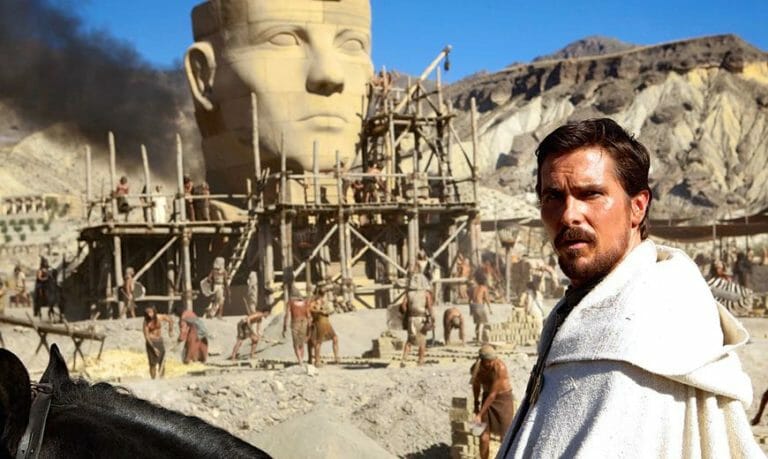By Nguyen Le · December 20, 2014

Twice by Cecil B. Demille, once by Dreamworks Pictures and now by the director of Gladiator, Moses will cross the Red Sea again. Controversy and constant déjà-vus aside, the latest telling sure is gorgeous but can leave you feeling empty. Might be acceptable, if all you need is pretty sights.
Similar to Aronofsky’s Noah, Exodus tells a familiar story one has seen or heard in some form with a touch of realism. It’s the one hook that our writers – Adam Cooper, Bill Collage, Jeffrey Caine and Steven Zaillian – use to get us on this well-worn path again. For the most part, they’ve succeeded.
In Exodus, the Nile’s waters turn red not because of Moses, but rather crocodiles on a feeding frenzy. Out of oxygen, frogs swim ashore. Some of the plagues seed the next in a logical manner. It is a rapidly-paced, intense and wonderfully realized sequence that perfectly represents the film’s commitment to be a more grounded version of what has been written about the liberator of 600,000 slaves.
And you might want to re-think the “parting” of the Red Sea as well, another nicely executed sequence that has been featured in all the promos.
This time around, God is now a young boy named Malak, played by 11 year-old Isaac Andrews with such intensity that might remind viewers of Christian Bale in his Empire of the Sun days. No longer a booming voice from above (or a quiet presence like in Noah), there is more reason to fear the Lord figure here. Furthermore, to grant Him this young form, Exodus highlights the idea that God’s guidance and judgment are too cruel, too snappy, without thought or restraint… like a child. Purists should have a heck of a day discussing this, besides the casting choices that stays in Hollywood tradition, of course.
The change also allows Moses to really stand out. Like Crowe’s Noah, Bale’s Moses goes through episodes of doubt, fear and outright anger being God’s chosen man, creating another layer to the character that in previous incarnations stick solid on the believe path. Then again, it seems more credit should be given to Bale’s well-known acting chops as other characters are incredibly underwritten.
Knowing Ridley Scott, there’s bound to be a longer cut out there. Until then, viewers must settle with a rather zippy, plot point-to-plot point blockbuster storytelling for 150 minutes. That might be fine to some, but does it suit the material? Sure enough the crew is qualified (and succeeded) in making this Bible story looks, well, biblical, though its lack of heart or impact to our emotions is definitely frustrating. Trouble might have stemmed either in the editing process or the fact that too many scribers are in the same room.
Exodus executes new changes when needed, allowing us to willingly cast that “I’ve seen this before” feeling aside and absorb the story once more. However, when novelty comes without humanity all that’s left are pretty pictures having no depth. Sometimes it’s worth the $10-12, sometimes it isn't.
I felt okay.
Maybe I needed something to wash The Counselor away, after all.
Photo: Scott Free Productions